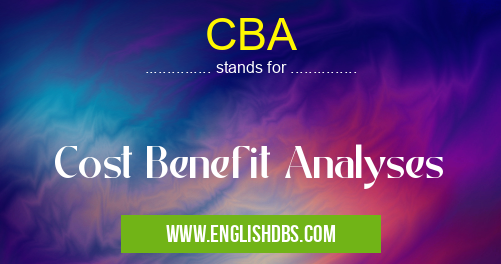What does CBA mean in ACCOUNTING
Cost Benefit Analyses (CBA) is a method use by both private and public sectors to evaluate the potential costs and benefits of proposed projects. It involves studying the potential risks, costs and benefits associated with undertaking an investment, project or policy initiative. CBA helps businesses, governments and other organizations decide whether to go ahead with a project or not.

CBA meaning in Accounting in Business
CBA mostly used in an acronym Accounting in Category Business that means Cost Benefit Analyses
Shorthand: CBA,
Full Form: Cost Benefit Analyses
For more information of "Cost Benefit Analyses", see the section below.
» Business » Accounting
Essential Questions and Answers on Cost Benefit Analyses in "BUSINESS»ACCOUNTING"
What is Cost Benefit Analyses?
Cost Benefit Analyses (CBA) is a method used by both private and public sectors to evaluate the potential costs and benefits of proposed projects. It involves studying the potential risks, costs and benefits associated with undertaking an investment, project or policy initiative.
How does Cost Benefit Analyses help organizations?
Cost Benefit Analyses helps businesses, governments and other organizations decide whether to proceed with a project or not. It helps them weigh the costs against the benefits that could be derived from it to determine if it is worth proceeding with a project or not.
What are some examples of cost factors taken into consideration when conducting CBA?
Examples of cost factors taken into consideration when conducting CBA include labour costs, material costs, taxes, insurance premiums, legal fees etc. The cost estimation should also include proper contingency for any unexpected expenses incurred in developing and implementing the project.
Is Cost Benefit Analyses applicable in all situations?
No, Cost Benefit Analyses may not be suitable for all situations. In cases where complete information about the future is not available such as local economic conditions, changes in demand for products etc., traditional methods such as CBA might not work well as decisions need to be made under uncertainty and incomplete information. Other methods such as decision tree analysis can be used instead to analyse complex investments that take into account uncertainties surrounding different scenarios.
Final Words:
Cost Benefit Analysis is a widely used decision-making tool that helps organizations make informed decisions regarding investments, projects or policy initiatives by weighing their potential risks against their anticipated rewards. Although it has some limitations such as difficulty accounting for intangible elements like social considerations or externalities which may affect outcomes, its ability to measure financial impacts make it an invaluable resource for businesses and governments alike looking for ways maximize returns on their investments while minimizing risk exposure across wide range of long-term initiatives.
CBA also stands for: |
|
| All stands for CBA |
